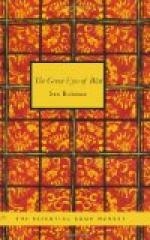The most notable thing was this: only one wing of Friar’s Park—that remote from the tower—exhibited any evidence of occupation, indeed of being habitable at all. In other words, the greater part of the building was no more than a majestic ruin. Eyeless windows there were and crumbling arches, whilst the chapel which had looked so picturesque from a distance proved on closer inspection to be a mere shell. A dense shrubbery grew right up to the walls of the east wing, that which was terminated by the tower, and I had been enabled to peer right in at the window of the chapel and out at a window at the other side; for the place was roofless and its floor carpeted with weeds. I could not help wondering how much of this decay dated from the days of Sir Burnham, for certainly I could not reconcile it with the character of the man as depicted by the local people.
My inquiry then was considerably narrowed down, for of the habitable apartments of Friar’s Park I had only been enabled to count seven or eight, although two of these appeared to be of great extent, one of them, I fancy, being the old refectory of the monastery. My next discovery was this: that the likeliest point of entry to the house was afforded by either one of two French windows which opened upon a small lawn some twenty yards beyond the drive. But in order to approach them I should have to expose myself in the brilliant moonlight which bathed that side of the house.
I stood there listening intently, and wondering if I dared attempt the venture. Not a sound could I detect, however, and the night was so still that scarce a leaf stirred about me. I determined upon the plunge; and walking boldly forward, I approached the more easterly of the two windows.
Three stone steps led up to it and linen blinds were drawn down within, but strengthened by the memory of the inn door which was “never locked,” and hoping that the same trustfulness prevailed in Friar’s Park, I turned the handle whose brassy glitter I had previously perceived from the corner of the shrubbery.
It operated smoothly, and upon giving a gentle push the window opened and I found myself standing upon a polished oak floor. I stood stock-still, listening; but there was never a sound; and partly reclosing the window, I pressed the button of my electric torch and looked about me.
I stood in a long lofty room which I supposed to have been a drawing-room. It was empty, containing not a single item of furniture. From my pocket I took two pairs of thick woolen socks and drew them one over the other on to my boots to deaden my footfalls. The door of this empty and desolate room was open, and, stepping softly, I walked out into a wide corridor, my mind filled with terrifying recollections of the Red House.
Three other rooms I explored, and although in two of them some items of massive furniture remained, covered with dust-sheets, no sign of habitation did I come upon. The whole of the ground floor proved to be vacant and a broad uncarpeted stair suggested that the floors above were also deserted by their occupants.




